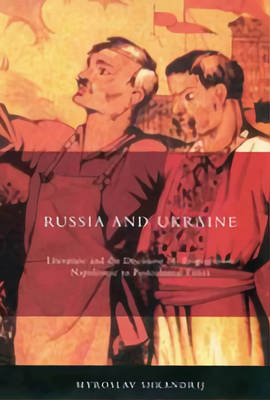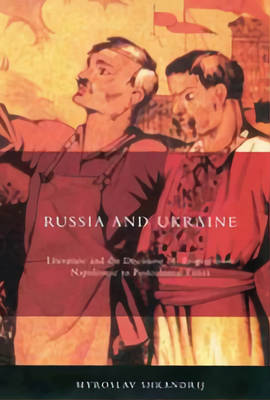
- Afhalen na 1 uur in een winkel met voorraad
- Gratis thuislevering in België vanaf € 30
- Ruim aanbod met 7 miljoen producten
- Afhalen na 1 uur in een winkel met voorraad
- Gratis thuislevering in België vanaf € 30
- Ruim aanbod met 7 miljoen producten
Zoeken
Russia and Ukraine
Literature and the Discourse of Empire from Napoleonic to Postcolonial Times
Myroslav Shkandrij
Hardcover | Engels
€ 137,95
+ 275 punten
Omschrijving
Concepts of civilizational superiority and redemptive assimilation, widely held among nineteenth-century Russian intellectuals, helped to form stereotypes of Ukraine and Ukrainians in travel writings, textbooks, and historical fiction, stereotypes that have been reactivated in ensuing decades. Both Russian and Ukrainian writers have explored the politics of identity in the post-Soviet period, but while the canon of Russian imperial thought is well known, the tradition of resistance B which in the Ukrainian case can be traced as far back as the meeting of the Russian and Ukrainian polities and cultures of the seventeenth century B is much less familiar. Shkandrij demonstrates that Ukrainian literature has been marginalized in the interests of converting readers to imperial and assimilatory designs by emphasizing narratives of reunion and brotherhood and denying alterity.
Specificaties
Betrokkenen
- Auteur(s):
- Uitgeverij:
Inhoud
- Aantal bladzijden:
- 368
- Taal:
- Engels
Eigenschappen
- Productcode (EAN):
- 9780773522343
- Verschijningsdatum:
- 9/10/2001
- Uitvoering:
- Hardcover
- Formaat:
- Genaaid
- Afmetingen:
- 155 mm x 234 mm
- Gewicht:
- 703 g

Alleen bij Standaard Boekhandel
+ 275 punten op je klantenkaart van Standaard Boekhandel
Beoordelingen
We publiceren alleen reviews die voldoen aan de voorwaarden voor reviews. Bekijk onze voorwaarden voor reviews.








